Uroflowmetry is a diagnostic test performed in the field of urology to assess the flow rate and patterns of urine during voiding. This non-invasive test helps evaluate the functionality of the lower urinary tract, including the bladder and urethra. The procedure is commonly conducted in a pathology or urology clinic and involves the following steps:
-
Patient Preparation:
- Before the test, patients may be instructed to drink a specific amount of water to ensure a normal filling of the bladder.
- It is essential to empty the bladder completely before the uroflowmetry to obtain accurate results.
-
Equipment Setup:
- A uroflowmetry machine is used to measure and record the volume of urine voided over time.
- The machine typically includes a uroflowmeter, which may be connected to a computer for data analysis.
-
Test Procedure:
- The patient is asked to urinate into a special funnel or uroflowmeter device that is connected to the uroflowmetry machine.
- During voiding, the machine records various parameters, including urine flow rate, voided volume, and the time taken to empty the bladder.
- The test is painless and does not require any catheterization.
-
Analysis of Results:
- The recorded data is analyzed to assess the speed and pattern of urine flow.
- Key parameters evaluated include the maximum flow rate (Qmax), average flow rate, voided volume, and time to peak flow.
-
Interpretation:
- Urologists or pathologists interpret the results to identify any abnormalities in the urinary flow.
- Abnormalities may suggest conditions such as bladder outlet obstruction, prostate issues, or other lower urinary tract disorders.
-
Clinical Applications:
- Uroflowmetry is used in the diagnosis and management of various urological conditions, such as benign prostatic hyperplasia (BPH), urethral strictures, and neurogenic bladder.
- It aids in treatment decisions and monitoring the effectiveness of interventions.
-
Patient Follow-Up:
- Based on the results, healthcare providers may recommend further tests or interventions to address identified issues.
- Follow-up uroflowmetry tests may be conducted to monitor progress or treatment outcomes.
In summary, uroflowmetry is a valuable diagnostic tool in pathology and urology, providing essential information about the dynamics of urine flow and aiding in the assessment and management of various urinary tract conditions.
